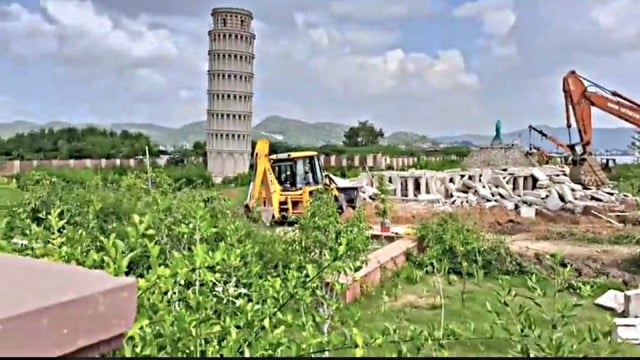ARTICLE AD BOX
 Acting on Supreme Court’s March directions, the Ajmer Development Authority (ADA) started tearing down the popular spot ahead of the September 17 deadline in the district administration’s affidavit. (Source: Express Photo)
Acting on Supreme Court’s March directions, the Ajmer Development Authority (ADA) started tearing down the popular spot ahead of the September 17 deadline in the district administration’s affidavit. (Source: Express Photo)
Demolition of Ajmer’s Seven Wonders Park began Friday – six months after the Supreme Court ordered its demolition saying it encroached upon Jaipur’s wetlands.
Acting on Supreme Court’s March directions, the Ajmer Development Authority (ADA) started tearing down the popular spot ahead of the September 17 deadline in the district administration’s affidavit.
This comes after the Supreme Court, on March 18, gave six months for its demolition while hearing concerns regarding construction in the wetland and green belt surrounding Anasagar Lake in Ajmer. The court also ordered the administration to take down the food court at Luv-Kush Garden in Vaishali Nagar by April 7, 2025.
However, despite the court’s directions, one statue was moved, with officials claiming that only one company had put forth their bid when tenders were floated.
Built under the Ajmer Smart City Project at a cost of around Rs 12 crore, the Seven Wonders Park was inaugurated in 2022 by then Chief Minister Ashok Gehlot.
In March 2023, former BJP councillor Ashok Malik filed a writ petition before the National Green Tribunal (NGT) highlighting destruction of wetlands around Anasagar lake. On August 11 that year, the National Green Tribunal ordered the park to be demolished, along with Patel Stadium, Gandhi Smriti Udyan, and the food court, observing that these constructions were built by encroaching upon the wetlands.
This order was appealed in the Supreme Court. Meanwhile, as the legal battles continued, Ashok Malik, the petitioner, and his son were arrested on November 6, 2023 and were eventually released on bail.
Story continues below this ad
In March 2025, the Supreme Court, which had refused to stay the demolition only three months before, reiterated that the park and the food court should be demolished and the wetlands should be restored in Ajmer. The bench said: “Your modus operandi does not seem to indicate that you want to make Ajmer smart. We wonder how a city can become smart without protecting water bodies and wetlands, and how can cities become smart by encroaching upon them”.



.png)
.png)
.png)























 English (US) ·
English (US) ·